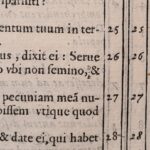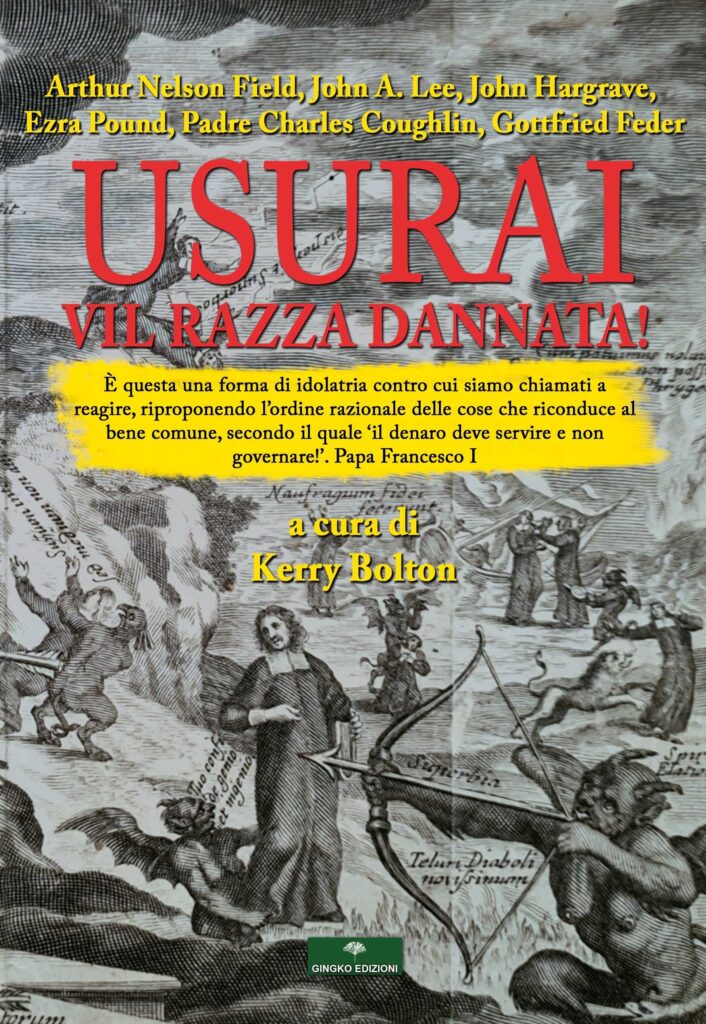Was Jesus on the side of the usurers?

Without a mass of usurers there would be no crowd of poor people. St. Gregory of Nissa (335-394).
My wife returns troubled by Sunday mass. He tells me that the old priest explained the parable of the talents to the servants, which is in the Gospel of Matthew 25, 14-30, and it was as if George Soros was speaking in the pulpit!
Usurer
I tell her it is not possible, Jesus threw the money changers out of the temple and the Catholic Church has always been a bulwark against usury, even if in recent centuries it has turned a blind eye. One of the reasons for the Lutheran and Calvinist schism was precisely that, within certain limits, the Protestants accepted usury.
He shows me the four pages distributed in the church and, even though we have recently published the book edited by Kerry Bolton entitled “Usurai, Vila Razza Damn” which deals with this topic, it puts me in obvious difficulty.
Usurer, vil damned race!

BUY THE BOOK ON OFFER
Jesus tells of a man (perhaps a king?) Who, having to go on a journey, called three of his servants to him, to the first he gave five talents (a large sum), to the second two talents, to the third a talent.
The first two managed to double the capital, while the third dug a hole in the ground and buried it.
When the master returned, he demanded an account of his money. He was happy with the first two but got angry with the third.
He justified himself by telling him: “Lord, I know that you are a hard man, that you reap where you have not sown and you reap where you have not scattered. I was afraid and went to hide your talent under the ground: this is what is yours ”and he gave him back the talent.
The gentleman gave him armchairs and did not accept his justification, telling him: “You should have entrusted my money to the bankers and so returning I would have withdrawn mine with interest (even usury is written in the Latin Bible).
This parable of Jesus confuses many theologians and certainly confused the priest who listened to my wife. The concept is that money must be turned around to exchange goods and services, but when money is lent to usury it is a mortal sin. Even the Jews were forbidden to lend it to their confreres at interest, but the possibility of lending it to the Gentiles was left open: “To a foreigner you can lend to usury; but to your brother you will not lend to usury, so that the Lord your God may bless you in everything you put your hand to in the country where you go ”(Dt 23,20). A detail that has generated endless tragedies.
Does the Bible talk about usury?
These prohibitions, as well as the general ethical and moral character of the New Testament, inherited from the classical world, established the foundations of Catholic social doctrine, for which the opposition to usury was a key element. In 325 the Council of Nicaea forbade usury among the clerics. Under the Emperor Charlemagne (768-814) the ban was extended to the laity. Here usury simply meant extracting more from the money than was being lent. This is in accordance with what Luke (6:35) stated in saying that one should not expect more back than what is given. In 1139, the Second Lateran Council of Rome declared that usury is a theft, and that the usurers should have returned the stolen goods. In 1312 the Council of Vienne, in France, established that anyone who claimed usury was a heretic and was excommunicated and could not be buried in consecrated land (Decrees: 29).
The usurer was seen as a thief of time, which belongs to God, therefore the banker who lends to usury is a thief who steals from God, nothing worse for St. Thomas Aquinas and St. Anthony of Padua.
In other passages of the Gospels, Jesus condemns usury, but then what did he mean with this parable? Could it be a translation error? All the passages in Italian of the Bible that are read in churches originate from the Vulgate. The Vulgate is a Latin translation of the Bible from the ancient Greek and Hebrew versions, mostly made by St. Jerome in 382.

BUY IT NOW
However, there are other versions of the Bible accepted by the Catholic Church. One of the most reliable and ancient, close to the Aramaic that Jesus spoke, is the Syriac Bible. I have one printed in Venice in 1609 and I consult it. Here is the offending passage:
Oportuit te committere pecunia mea mensa, & ego venissem ac repetissem quod meum est cum foenore.
There is no mention of usury, nor of bankers (or money changers) but only of one's own profit (foenore). In the classic version of the Vulgate, on the other hand, we talk about money changers and usury. So, sorry to blame San Gerolamo, but perhaps he too, like Homer, sometimes dozed. Moreover, even St. Augustine himself wrote that if we observe something that is different from what is written in the Bible, perhaps it is an error of the copyist who transcribed it.
Angelo Paratico
Arthur Nelson Field, John A. Lee, John Hargrave, Ezra Pound, Father Charles Coughlin, Gottfried Feder. "Usurai Vil Damned Race!" edited by Kerry Bolton, Euro 18, ISBN 9788831229173.
BUY IT NOW

Thanks to our Telegram channel you can stay updated on the publication of new articles of Economic Scenarios.
Was the article Jesus on the side of the usurers? comes from ScenariEconomici.it .
This is a machine translation of a post published on Scenari Economici at the URL https://scenarieconomici.it/gesu-stava-dalla-parte-degli-usurai/ on Sat, 21 Nov 2020 09:30:08 +0000.
